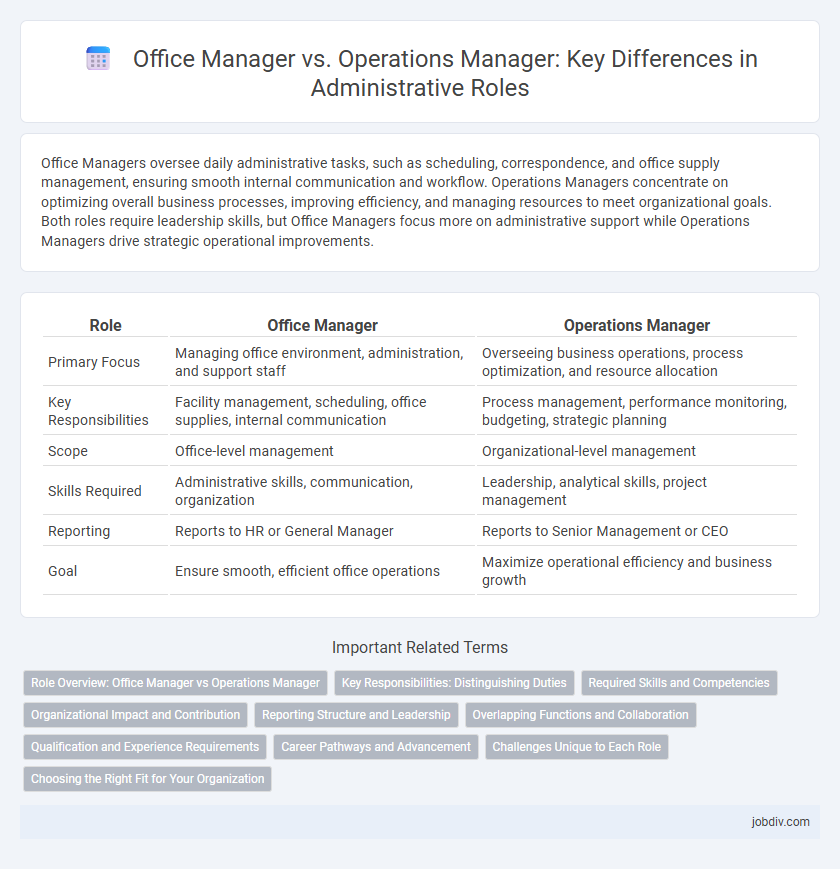Office Managers oversee daily administrative tasks, such as scheduling, correspondence, and office supply management, ensuring smooth internal communication and workflow. Operations Managers concentrate on optimizing overall business processes, improving efficiency, and managing resources to meet organizational goals. Both roles require leadership skills, but Office Managers focus more on administrative support while Operations Managers drive strategic operational improvements.
Table of Comparison
| Role | Office Manager | Operations Manager |
|---|---|---|
| Primary Focus | Managing office environment, administration, and support staff | Overseeing business operations, process optimization, and resource allocation |
| Key Responsibilities | Facility management, scheduling, office supplies, internal communication | Process management, performance monitoring, budgeting, strategic planning |
| Scope | Office-level management | Organizational-level management |
| Skills Required | Administrative skills, communication, organization | Leadership, analytical skills, project management |
| Reporting | Reports to HR or General Manager | Reports to Senior Management or CEO |
| Goal | Ensure smooth, efficient office operations | Maximize operational efficiency and business growth |
Role Overview: Office Manager vs Operations Manager
An Office Manager oversees administrative functions, including office coordination, staff supervision, and resource management to maintain daily workflow efficiency. An Operations Manager focuses on optimizing business processes, managing supply chains, and ensuring operational goals align with company strategy. Both roles require leadership skills but differ in scope, with Office Managers handling internal office environments and Operations Managers driving broader organizational performance.
Key Responsibilities: Distinguishing Duties
Office Managers primarily oversee administrative tasks such as scheduling, correspondence, and managing office supplies to ensure a smooth workplace environment. Operations Managers focus on optimizing business processes, coordinating cross-departmental workflows, and managing production or service delivery to enhance operational efficiency. Both roles require strong leadership and organizational skills but differ significantly in scope, with Office Managers handling internal office functions and Operations Managers driving overall business performance.
Required Skills and Competencies
Office Managers require strong organizational skills, proficiency in office software, and effective communication to coordinate administrative tasks and manage office resources efficiently. Operations Managers need strategic thinking, process optimization expertise, and leadership abilities to oversee business operations and improve productivity. Both roles demand problem-solving skills and the ability to manage teams, but Operations Managers focus more on operational efficiency while Office Managers emphasize administrative support.
Organizational Impact and Contribution
Office Managers streamline administrative functions by coordinating schedules, managing communication channels, and overseeing office resources, which enhances internal workflow efficiency and supports staff productivity. Operations Managers drive organizational performance through strategic planning, process optimization, and resource allocation, directly impacting profitability and operational scalability. Both roles contribute to organizational success by ensuring smooth daily operations and aligning activities with broader business objectives.
Reporting Structure and Leadership
Office Managers typically report to a department head or senior administrator, overseeing administrative staff and ensuring smooth daily operations within a specific office or location. Operations Managers have a broader reporting structure, often directly accountable to top executives like the COO or CEO, responsible for aligning operational processes with organizational goals across multiple departments. Leadership for Office Managers centers on managing support teams and office logistics, while Operations Managers lead cross-functional teams to optimize efficiency and drive strategic initiatives.
Overlapping Functions and Collaboration
Office Managers and Operations Managers share overlapping functions such as coordinating staff schedules, managing office supplies, and ensuring workplace efficiency. Both roles collaborate closely on streamlining administrative processes, implementing company policies, and supporting communication between departments to enhance overall organizational performance. Effective teamwork between Office and Operations Managers drives operational consistency and optimizes resource allocation across the company.
Qualification and Experience Requirements
Office Managers typically require a bachelor's degree in business administration or a related field, alongside 3 to 5 years of experience in office management or administrative roles. Operations Managers often need a higher level of education such as a bachelor's or master's degree in business management, operations, or supply chain, combined with 5 to 7 years of experience in operations, project management, or process optimization. Strong leadership, organizational skills, and familiarity with business software are essential qualifications for both positions, but Operations Managers generally require deeper expertise in strategic planning and operational analytics.
Career Pathways and Advancement
Office Managers typically advance by gaining expertise in administrative coordination, progressing toward roles such as Executive Assistant or Administrative Director, while honing skills in team supervision and office technology. Operations Managers often follow a trajectory toward senior management positions like Director of Operations or Chief Operating Officer by developing strategic planning, process optimization, and leadership capabilities. Both pathways emphasize leadership development, with Operations Managers leaning more toward organizational strategy and Office Managers focusing on efficient administrative management.
Challenges Unique to Each Role
Office Managers face challenges managing diverse administrative tasks, coordinating office logistics, and maintaining efficient communication across departments. Operations Managers encounter complexities aligning operational processes with business goals, optimizing supply chain workflows, and driving cross-functional team performance. Both roles require strategic problem-solving but differ in scope, with Office Managers focusing on internal office dynamics and Operations Managers overseeing broader organizational functions.
Choosing the Right Fit for Your Organization
Office Managers oversee daily administrative tasks, including scheduling, correspondence, and office supply management, ensuring smooth internal operations. Operations Managers focus on optimizing organizational processes, managing resources, and coordinating cross-functional teams to improve efficiency and productivity. Choosing the right fit depends on whether your organization needs focused administrative support or strategic process management to drive growth.
Office Manager vs Operations Manager Infographic

 jobdiv.com
jobdiv.com